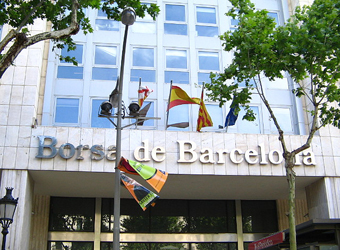It requires a focused mind and steady nerves to trade in and out of Spanish banking stocks these days, with the continued tit-for-tat political broadsides firing back and forth between Barcelona and Madrid on almost a daily basis.
Just two weeks since roughly two fifths of the population of the Spanish province of Catalonia voted overwhelmingly for independence in a referendum that Spanish judicial authorities had deemed illegal, there is still a marked lack of clarity on the region’s future. And investors, like the many businesses that have shifted their headquarters out of Catalonia, rarely like uncertainty.
Last Tuesday the Catalan president addressed the regional assembly of 135 lawmakers, and declared he had a mandate to declare Catalonia an independent republic. Standing outside the handsome 18th Century arsenal-turned-parliament in the Parc de la Ciutadella, you could hear celebratory shouts from the crowd several hundred yards away, blocked off by hundreds of local and national police. But just moments later, Puigdemont undercut his groundbreaking declaration, by requesting its suspension to allow for dialogue with Madrid. And while many lawmakers from his coalition willingly signed a document declaring independence that night, several notably did not then sign a corresponding document that formalized the suspension.
Earlier in the day I had spoken to several Catalan lawmakers, who had anticipated a move like this. They pointed out that Puigdemont was caught between a rock and a hard place, since he must maintain the new-found momentum towards Catalan independence engendered by the previous weekend’s referendum or risk losing control of his fractious coalition; but he had also to weigh that against the threats advanced by Madrid, suggesting that the central government would intervene — with the involvement of security forces as required — and suspend Catalonia’s hard-won autonomy.
Immediately after he finished speaking inside the Parlament de Catalunya, the reactions of ordinary Catalans we spoke to on the streets outside the park were mixed, in some ways reflecting their leader’s carefully calibrated political triangulation. One dejected man told me that Puigdemont’s long-awaited speech — after the police violence witnessed across the region on referendum day — had been a bit disappointing.
“Let’s hope that this dialogue that our president wanted for our country, so that other countries would support us, is something that will happen,” he said, without much conviction. Another man, draped in the Catalan flag that hung from many buildings across the city that night, insisted it was a victory for the independence movement because, he said, “we are going for what we want.”
The response from the Spanish government was unequivocal and swift, and the following morning the attacks on Puigdemont turned personal. Spain’s Deputy Prime Minister, Soraya Saenz de Santamaria, made a blistering statement in which she said the Catalan leader “doesn’t know where he is, where he is going and with whom he wants to go.” And Puigdemont’s hope that European leaders might possibly intervene or jump-start mediation may have swiftly faded, with French President Emanuel Macron arguing against any mediation from the European Union.
Spanish Prime Minister Mariano Rajoy — with his reputation as a political survivor with unrivalled levels of strategic patience — subsequently played for further time in a measured statement later last week. He requested clarification from Puigdemont on whether the Catalan leader had indeed declared independence last Tuesday night. And by doing so, “put the ball back in Puigdemont’s side of the court,” according to Xavier Domenecq, a senior member of the Podemos party’s Catalan subsidiary, and a high-profile critic of Rajoy and his center-right Partido Popular in the Madrid parliament.
That request from Rajoy inexorably led to the events at the start of this week, with the Spanish IBEX 35 index falling more than three quarters of a percent in the first 15 minutes of trading on Monday, after Carles Puigdemont’s written response to Rajoy was published by local media. The Catalan president failed to answer in plain language whether he had indeed declared independence the previous week, and instead demanded a two month window for dialogue, requesting urgent direct talks with Madrid. He said this request was “sincere,” but he surely knew that Madrid would not soften its stance after the Spanish authorities’ repeated insistence that no negotiations would be possible unless the threat of independence was taken off the table.
Within an hour of that letter’s publication de Santamaria — Spain’s head spymaster and the bad cop to Rajoy’s attempted good cop — took to the airwaves once more with a rebuttal. She said the Catalans were simply prolonging the situation, and that Madrid was disappointed Puigdemont had not answered in plain language with a simple yes or no.
“It’s not a hard question we have asked,” she thundered, “it’s not a hard question to respond to.”
But for a Catalan leader trying to maintain his grip on a diverse political alliance in a historically turbulent period, that may not be entirely true. One long-standing pro-independence Catalan politician last week joked to me that this was a game of political chess, between two stubborn players with everything to lose. But of course it’s not just two men’s political reputations at stake, but the future of millions of ordinary Catalans, regional and national economies, businesses, jobs, and indeed — for some Catalans — the definition of democracy in modern Europe.
Source: CNBC


